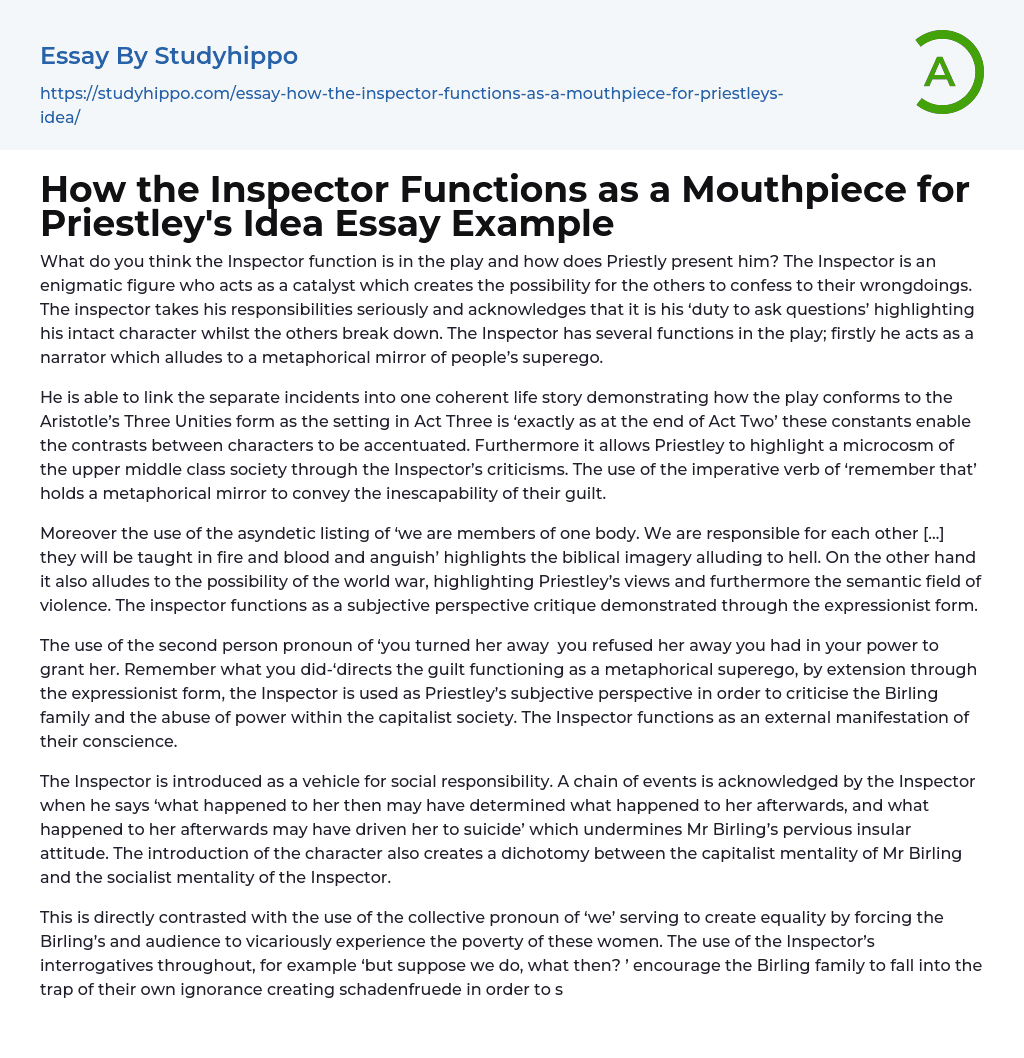

How the Inspector Functions as a Mouthpiece for Priestley’s Idea Essay Example
What do you think the Inspector function is in the play and how does Priestly present him? The Inspector is an enigmatic figure who acts as a catalyst which creates the possibility for the others to confess to their wrongdoings. The inspector takes his responsibilities seriously and acknowledges that it is his ‘duty to ask questions’ highlighting his intact character whilst the others break down. The Inspector has several functions in the play; firstly he acts as a narrator which alludes to a metaphorical mirror of people’s superego.
He is able to link the separate incidents into one coherent life story demonstrating how the play conforms to the Aristotle’s Three Unities form as the setting in Act Three is ‘exactly as at the end of Act Two’ these constants enable the contrasts between characters to be accentuated. Furthermore it allows Pries
...tley to highlight a microcosm of the upper middle class society through the Inspector’s criticisms. The use of the imperative verb of ‘remember that’ holds a metaphorical mirror to convey the inescapability of their guilt.
Moreover the use of the asyndetic listing of ‘we are members of one body. We are responsible for each other […] they will be taught in fire and blood and anguish’ highlights the biblical imagery alluding to hell. On the other hand it also alludes to the possibility of the world war, highlighting Priestley’s views and furthermore the semantic field of violence. The inspector functions as a subjective perspective critique demonstrated through the expressionist form.
The use of the second person pronoun of ‘you turned her away you refused her away you had in your power to grant her. Remember what you did-‘directs
the guilt functioning as a metaphorical superego, by extension through the expressionist form, the Inspector is used as Priestley’s subjective perspective in order to criticise the Birling family and the abuse of power within the capitalist society. The Inspector functions as an external manifestation of their conscience.
The Inspector is introduced as a vehicle for social responsibility. A chain of events is acknowledged by the Inspector when he says ‘what happened to her then may have determined what happened to her afterwards, and what happened to her afterwards may have driven her to suicide’ which undermines Mr Birling’s pervious insular attitude. The introduction of the character also creates a dichotomy between the capitalist mentality of Mr Birling and the socialist mentality of the Inspector.
This is directly contrasted with the use of the collective pronoun of ‘we’ serving to create equality by forcing the Birling’s and audience to vicariously experience the poverty of these women. The use of the Inspector’s interrogatives throughout, for example ‘but suppose we do, what then? ’ encourage the Birling family to fall into the trap of their own ignorance creating schadenfruede in order to satirise the ignorance and people of her ilk which furthermore alludes the murder mystery form creating tension.
- Values of Life essays
- Ethical dilemma essays
- Normative Ethics essays
- Virtue Ethics essays
- Belief essays
- Deontology essays
- Moral essays
- Virtue essays
- Work Ethic essays
- Acceptance essays
- Age Of Enlightenment essays
- Child Observation essays
- Confucianism essays
- Conscience essays
- Critical Reflection essays
- Destiny essays
- Determinism essays
- Empiricism essays
- Environmentalism essays
- Epistemology essays
- Ethics essays
- Ethos essays
- Existence essays
- Existentialism essays
- Fate essays
- Free Will essays
- Functionalism essays
- Future essays
- Good And Evil essays
- Human Nature essays
- Individualism essays
- Meaning Of Life essays
- Metaphysics essays
- Natural Law essays
- Personal Philosophy essays
- Philosophers essays
- Philosophy Of Life essays
- Political Philosophy essays
- Pragmatism essays
- Reality essays
- Relativism essays
- Teaching Philosophy essays
- Time essays
- Transcendentalism essays
- Truth essays
- Utilitarianism essays
- John Locke essays
- 9/11 essays
- A Good Teacher essays
- A Healthy Diet essays



